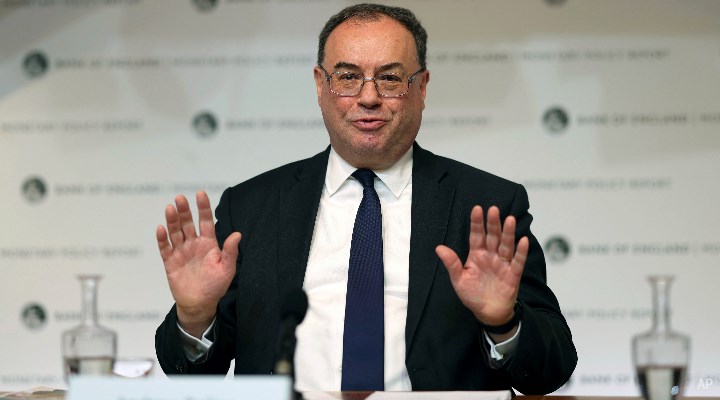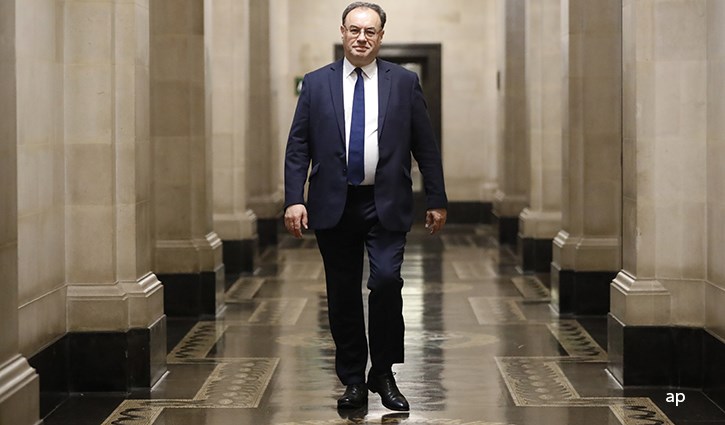
We’re in for a Tough Year
Astronomical energy price rises are leaving people up and down the UK worried about paying the bills this spring. Announcing a major government intervention to see off this spiralling cost of living, chancellor Rishi Sunak looked and sounded as slick as ever. But there were difficult questions too, namely whether the Treasury’s top minister still supports his boss. Make sure you check out senior editor James Gard’s explanation of why Sunak is having to intervene here, which highlights just how many of the factors at play are out of the UK government’s control.
Don't Ask For a Pay Rise
Asking for a pay rise to pay your bills will only further stoke inflation, Bank of England boss Andrew Bailey said this week. Caveating the remarks by acknowledging that this would be “painful” for families in practice, Bailey observed wage rises needed to be kept under close control. The GMB union branded the remarks a “sick joke”.
The Meta Fallout Was an Overreaction
This week shares in Meta Platforms (FB) plunged on missed earnings targets, but the Morningstar view was more sanguine. “We believe the market is overreacting to Meta’s fourth-quarter 2021 results. With the stock down 23% in after hours, it is now trading at only nine-to-10 times consensus 2022 adjusted EBITDA, much lower than historical levels," senior equity analyst Ali Mogharabi said. He is sticking with the company’s revenue and profit forecasts until the end of 2026, which support our $400 fair value estimate.
The Jury’s Out on Spotify
This week, no-moat music platform Spotify (SPOT) released disappointing earnings guidance for the first quarter of 2022, amid a crisis over its hosting of The Joe Rogan Experience podcast. On a call with analysts, chief executive and founder Daniel Ek said he wasn’t quite sure what the impact of the controversy on the company would be, though he did say issues of this kind have historically lasted for “months and not days”. For context, Spotify only started to post an operating profit in Autumn last year. Given that this milestone was driven by expanded advertising revenue, observers are now mindful of the reputational damage done not just to the company’s brand, but to its potentially-image-conscious clients too.
SJP’s Rebrand Looks Lovely
Forgive me for missing this one last Friday. Amid the maelstrom of January’s final days, the UK’s largest financial advice network St James's Place (SJP) announced a modernised new brand. Ditching the words “wealth management” from its updated imagery, SJP said it had settled on a refreshed icon that paid due respect to its history. So, the history. The seeds of this move can arguably be found in a series of investigative (and very negative) stories published by The Sunday Times during 2019 regarding the company’s culture and remuneration. The rebrand does indeed look lovely, but investors should remember that slick imagery and an extremely effective customer sales process is only one part of the equation. See my check-list for what an adviser should be giving you here.
We're About to Get Vaccine No. 5
US company Novavax has manufactured a Covid-19 vaccine, and UK approval this week means it’s now the fifth shot available to Britons. According to the BBC, millions of doses are now being rolled at a factory on Teesside, and health secretary Sajid Javid is working with the Joint Committee on Vaccination and Immunisation to weigh up whether to release it to the general public. Novavax says the jab itself offers up to 98% protection against Covid-19.
ESG’s Critics Are Angry
ESG’s fans may outnumber its critics by quite a substantial margin, but the latter are fervent in their beliefs. And they have many beliefs. From the Financial Times' US editor, who accuses the financial services industry of propagating the assumption that ESG equates to superior performance, to the former BlackRock sustainability CIO who compared ESG proponents to the National Rifle Association, there is plenty of fervour on the topic.
Amazon is Still Undervalued
Robust earnings for the final quarter of 2021 handed Amazon shares with a bounce this week, but our analyst still thinks the company is undervalued despite the rally. “We are maintaining our fair value estimate for wide-moat Amazon at $4,100 per share, and despite shares rising 12% after hours, we still view shares as undervalued.”
Be Careful in China
Fettered access, government interference, and an investor base skewed heavily toward retail traders make the Chinese stock market a target-rich world for savvy investors, but it’s important to understand the environment you’re operating in. So said Morningstar director of passive fund research Ben Johnson in this analysis marking Chinese New Year on Tuesday. Decades of rapid economic expansion haven’t always translated to gains for investors, so it’s important to understand why that is, and how to avoid ending up in the same camp.
Meme Stocks Are Still Dangerous
It’s brave to admit your investing errors. Kudos to DIY investor Charles Webb, who this week told Morningstar writer Emma Simon his own experience of buying individual shares. “It’s easy to get swamped with information, which makes decisions difficult. I’ve had a few bad performers in my portfolio, for example Reckitt Benckiser. I also bought one GameStop Corp Class A share at the absolute top of the market. My lesson from this was don’t do meme-stocks unless you get in right at the start.”





























